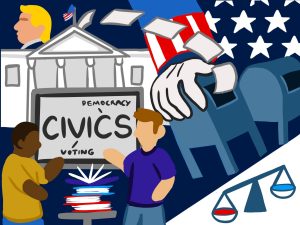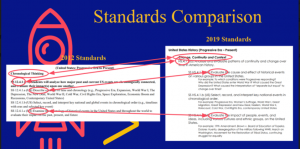Social Studies Instructional Shifts
With the implementation of the 2019 Nebraska Social Studies Standards also come instructional shifts. The information below highlights the three (3) instructional shifts in Nebraska social studies and resources to help you learn more about them. The instructional shifts include Inquiry-Based Learning, civic education, and multiculturalism.
Instructional Shift I: Inquiry-Based Learning
The dimensions listed below reflect the Dimensions found in the C3 Framework.
Dimension 1 – Developing Questions and Planning for Inquiries
One of the latest and most promising instructional shifts in social studies education is towards inquiry-based learning. With its roots found in John Dewey’s, among others, philosophy that students learn best while doing, inquiry-based learning seeks to build on the natural curiosity of students and engage their problem solving skills, while accessing personal experiences to make informed and well-supported opinions about the world in which they live. To quote Brazilian educator, advocate, and philosopher Paulo Freire, an inquiry education “provoke[s] the discovering of need for knowing and never to impose the knowledge whose need was not yet perceived”.* By clicking on the following names of education related groups and organizations, you will be taken to websites that provide inquiry-based and open educational resources.
https://www.education.ne.gov/socialstudies/c3-framework-and-inquiry-based-learning/
Dimension 2 – Applying Disciplinary Concepts and Tools
Social studies is the foundation upon which learners make sense of the world around them. Social studies provides students with context, problem solving skills, ability to make judgments, and character development. We begin to lose all those values when we marginalize social studies or force social studies educators to devote their class time to teaching ELA or math skills. By using Inquiry-based learning educators can focus on content and allow the teaching process to make natural interdisciplinary connections and students have shown an improvement in literacy and comprehension.
Dimension 3 – Evaluating Sources and Using Supporting Evidence
Learners of all ages spend significant time evaluating sources and using supportive evidence. Even children as young as four and five use these skills quite frequently.
The way children reason about sources of information about people intersects with many issues of interest to developmental psychologists, including the development of person perception (Ruble & Dweck, 1995; Yuill, 1997) and critical thinking skills (see Gopnik & Graf, 1988). It also has implications for how children make use of other people’s knowledge: Excessive skepticism about sources can lead children to miss opportunities for learning, and a complete lack of skepticism can leave children vulnerable to being manipulated or misinformed (see Baldwin & Moses, 1996; Robinson, Champion, & Mitchell, 1999).
Heyman GD, Legare CH. Children’s evaluation of sources of information about traits. Dev Psychol. 2005;41(4):636-647.
Evaluating sources requires that we ask questions. Are the sources reliable? Are they accurate and what is the objective of the source? Both evaluating sources and using supporting evidence represent the highest level of student thought and to make sense of the world, students must tap into multiple and sometimes multifaceted resources. One of the goals of social studies education should be to develop these crucially important skills in all learners.
NCSS Dimension 3 – Evaluating Sources and Using Supportive Evidence
Teaching Tolerance – Evaluating Online Sources (9-12)
Teaching Tolerance – Evaluating Online Sources (3-5)
CommonSense.Org – Evaluating Legitimate Sources (5-12)
Dimension 4 – Communicating Conclusions and Taking Informed Action
Having worked independently and collaboratively through the development of questions, the application of disciplinary knowledge and concepts, and the gathering of sources and use of evidence and information, students formalize their arguments and explanations. Products such as essays, reports, and multimedia presentations offer students opportunities to represent their ideas in a variety of forms and communicate their conclusions to a range of audiences. Students’ primary audiences will likely be their teachers and classmates, but even young children benefit from opportunities to share their conclusions with audiences outside their classroom doors.
From NCSS – “The Inquiry Arc of the C3 Framework”
From Past to Present: Taking Informed Action
Instructional Shift II: Civic Education
 Civic education is not only foundational but necessary for the future of our communities, state, country, and world. Before we ask students to engage and participate in democratic activities like voting, participation in a public body, or discussing the political climate with neighbors, it is the job of educators and education professionals to ensure that students understand, value, and demonstrate values that we hold dear. Civic education promotes skills vital to the success of Nebraska students like critical thinking, gathering and processing information, speaking, listening, organizing, explaining, evaluating, analyzing, selecting and defending a position, and reasoning. According to a 2020 report from The Brookings Institution, “we see evidence of . . . limited civic knowledge of the American public, 1 in 4 of whom, according to a 2016 survey led by Annenberg Public Policy Center, are unable to name the three branches of government. It is not only knowledge about how the government works that is lacking—confidence in our leadership is also extremely low.” Which is why there is no time like the present to be intentional around our work to embed skills associated with civics into social studies curriculum.
Civic education is not only foundational but necessary for the future of our communities, state, country, and world. Before we ask students to engage and participate in democratic activities like voting, participation in a public body, or discussing the political climate with neighbors, it is the job of educators and education professionals to ensure that students understand, value, and demonstrate values that we hold dear. Civic education promotes skills vital to the success of Nebraska students like critical thinking, gathering and processing information, speaking, listening, organizing, explaining, evaluating, analyzing, selecting and defending a position, and reasoning. According to a 2020 report from The Brookings Institution, “we see evidence of . . . limited civic knowledge of the American public, 1 in 4 of whom, according to a 2016 survey led by Annenberg Public Policy Center, are unable to name the three branches of government. It is not only knowledge about how the government works that is lacking—confidence in our leadership is also extremely low.” Which is why there is no time like the present to be intentional around our work to embed skills associated with civics into social studies curriculum.
Understanding the importance of civic education, our State Unicameral revised and approved in March of 2019 State Statute 79-724. The statute asserts that “civic competence is necessary to sustain and improve our democratic way of life and must be taught in all public, private, denominational, and parochial schools. A central role of schools is to impart civic knowledge and skills that help our youth to see the relevance of a civic dimension for their lives.” As such, teaching civics education is also state law and should be embraced by all content areas and must be taught in correlation with each of the four (4) remaining social studies disciplines (economics, financial literacy, geography, and history).
Civic Education Resources
The following are free of charge civic education resources for teachers and other stakeholders who may find the information helpful and are for students of all ages. Please refer to the NDE Social Studies Civics webpage for additional resources.
National Center for State Courts
Instructional Shift III: Multiculturalism 
As Nebraska schools grow more diverse, it has become imperative the we introduce and maintain a multicultural education that embodies the spirit of “Windows, Mirrors, and Sliding Glass Doors”. Each classroom should reflect the cultures of the student body, provide an opportunity for them to peer into the lives others, and allow students to authentically engage with different cultures and communities. According to the National Association for Multicultural Education, multicultural education, broadly, is a range of strategies educators use to help students “develop a positive self-concept by providing knowledge about the histories, cultures, and contributions of diverse groups.” Additionally, teachers are tasked with understanding that multicultural education is a process because its goals are ideals that teachers and administrators should constantly strive to achieve.
Specific to Nebraska education, Section 1(d) of State Statute 79-724 states, “review and approve the social studies curriculum to ensure that it stresses the services of the men and women who played a crucial role in the achievement of national independence, establishment of our constitutional government, and preservation of the union and includes the incorporation of multicultural education as set forth in sections 79-719 to 79-723 in order to instill a pride and respect for the nation’s institutions and not be merely a recital of events and dates.” It is the increasingly diverse population of Nebraska and state law that requires social studies instruction to highlight multicultural studies.
Multiculturalism Resources
American Indian, Native American, and Indigenous Persons Resources
Inclusive Schools Network Inclusion Resources
Learning for Justice Classroom Resources
Scholastic: Multiculturalism and Diversity




